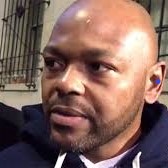 wbaltv.com
After they left the store, a man came up and tried to rob them. Shipley ran. Kevin Smith refused to give up his wallet and was shot. The robber ran away. Gene Smith briefly chased him and shouted, “I know who you are!” He then returned to his brother, who lay in the street. Kevin Smith was pronounced dead at 10:58 p.m.
The talk in the neighborhood was that a man named Larry Davis did the shooting. Baltimore City police told Smith about this on October 27, and they showed him a photo array. But they inadvertently used a photo of a different Larry Davis, and Smith was unable to make an identification.
The next day, a man named Allen Scott was arrested and charged with a series of car thefts. While being interrogated about the thefts, Scott said he had also been robbed at gunpoint on the night of October 25. He said the robber was 20-year-old Clarence Shipley, Michelle Shipley’s brother.
Police put a photo of Clarence in a photo array, and Gene Smith identified him as the man who had shot and killed his brother.
Shipley was arrested on November 3, 1991, and charged with murder and attempted armed robbery. He said he was with his girlfriend at her house that night. He said he had other alibi witnesses as well, but the police made only a cursory effort to check them out.
Shipley’s trial began in Baltimore City Circuit Court on June 10, 1992. There was no physical evidence tying him to the shooting. The state’s case was based on Gene Smith’s identification and the corroborating testimony of Scott, who testified as a rebuttal witness. However, Scott’s testimony came into question when he recanted, testifying that the information he had given police about where he was on the night of the shooting and what he had seen had been incorrect.
Shipley was convicted by a jury on June 12, 1992 of first-degree murder, three counts of attempted armed robbery, and three counts of use of a handgun in commission of an act of violence. He was sentenced to life in prison.
Shipley’s initial appeals, focused largely on questions regarding the effectiveness of his trial counsel, failed.
In 2014, his family hired a retired Baltimore Police Department officer as a private investigator. After examining the police file and conducting preliminary interviews, the investigator contacted the University of Baltimore Innocence Clinic, an affiliate of the Mid-Atlantic Innocence Project that is a collaboration between the Office of the Public Defender and the University of Baltimore School of Law. The clinic conducted more interviews, and then requested the Conviction Integrity Program of the Baltimore City State’s Attorney’s Office to review the case.
The investigation uncovered significant evidence of Shipley’s innocence, as well as missed opportunities to arrest Smith’s real killer.
Weeks before Shipley’s trial was to start, Baltimore Police learned that the correct Larry Davis was in the city jail awaiting trial on armed robbery charges. They interviewed him, and Davis told the investigators that he knew he was a suspect in Smith’s death, but that he was innocent. The detectives believed his claim of innocence and didn’t pursue it any further.
In 2014, Scott told investigators that he never saw Shipley on the night of the murder, and that the police gave him Shipley’s name as part of a deal to reduce his car-theft charges. Scott had been originally charged with seven counts of car theft, but he was convicted of only a single count. This information was not revealed at trial.
New witnesses also came forward. Among them was Larry Davis’s former girlfriend, who said she was with him at the time of the robbery and saw the shooting. She had struggled with addiction and did not come forward because she was afraid of Davis, who had died in 2005.
In addition, two other witnesses said that Davis had tried to rob them on the same night.
Most significantly, Shipley’s sister—who was present at the shooting—gave a statement. She said that Gene Smith had met up with Davis earlier that night. The two hatched a plan to rob Kevin Smith because he was known to carry a lot of cash from his job as a chef. She admitted she saw Davis shoot Smith when the robbery failed. At Shipley’s trial, she had falsely testified that she didn’t know who had shot Smith.
On December 14, 2018, the Baltimore City state’s attorney moved to vacate Shipley’s conviction and dismiss the charges. Judge Jeffrey Geller of Baltimore Circuit Court granted the motion on December 18.
Speaking to reporters outside the courthouse, Shipley reflected on what he had lost during the 27 years he spent in prison: the birth of a grandson, the death of one of his sons, and time with family and friends. He had gotten married while in prison in Hagerstown.
He said he kept believing in God and that he harbored no resentment toward those whose testimony led to his conviction. “I forgive them,” he said, according to the Baltimore Sun. “I’m just wanting to go to church.”
In October 2019, Shipley was awarded $2.1 million in compensation from Maryland's Board of Public Works.
– Ken Otterbourg
|